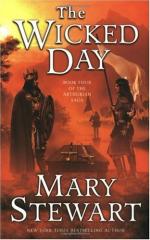|
This section contains 145 words (approx. 1 page at 300 words per page) |

|
Stewart's The Wicked Day, like her earlier Merlin trilogy, is drawn from the various medieval works about King Arthur, especially Geoffrey of Monmouth's History of the Kings of Britain and Sir Thomas Malory's Le Morte D'Arthur (1485), which she cites in her notes. Yet the novel also centers on the problem of free will versus predestiny. Like Shakespeare's Hamlet, Mordred complains that we are like flies to the Gods and at their mercy.
There is, indeed, a resemblance between the brooding Mordred and the musing Hamlet. Both are tragic figures, unable to prevent their own doom. The conflict between Mordred and Arthur is also strongly reminiscent of the Greek tragedy of Oedipus. Even though Mordred is acquainted with the dire prophecy, he trusts in his ability to avoid it, a sign of intellectual pride which borders on the Greek concept of hubris.
|
This section contains 145 words (approx. 1 page at 300 words per page) |

|




